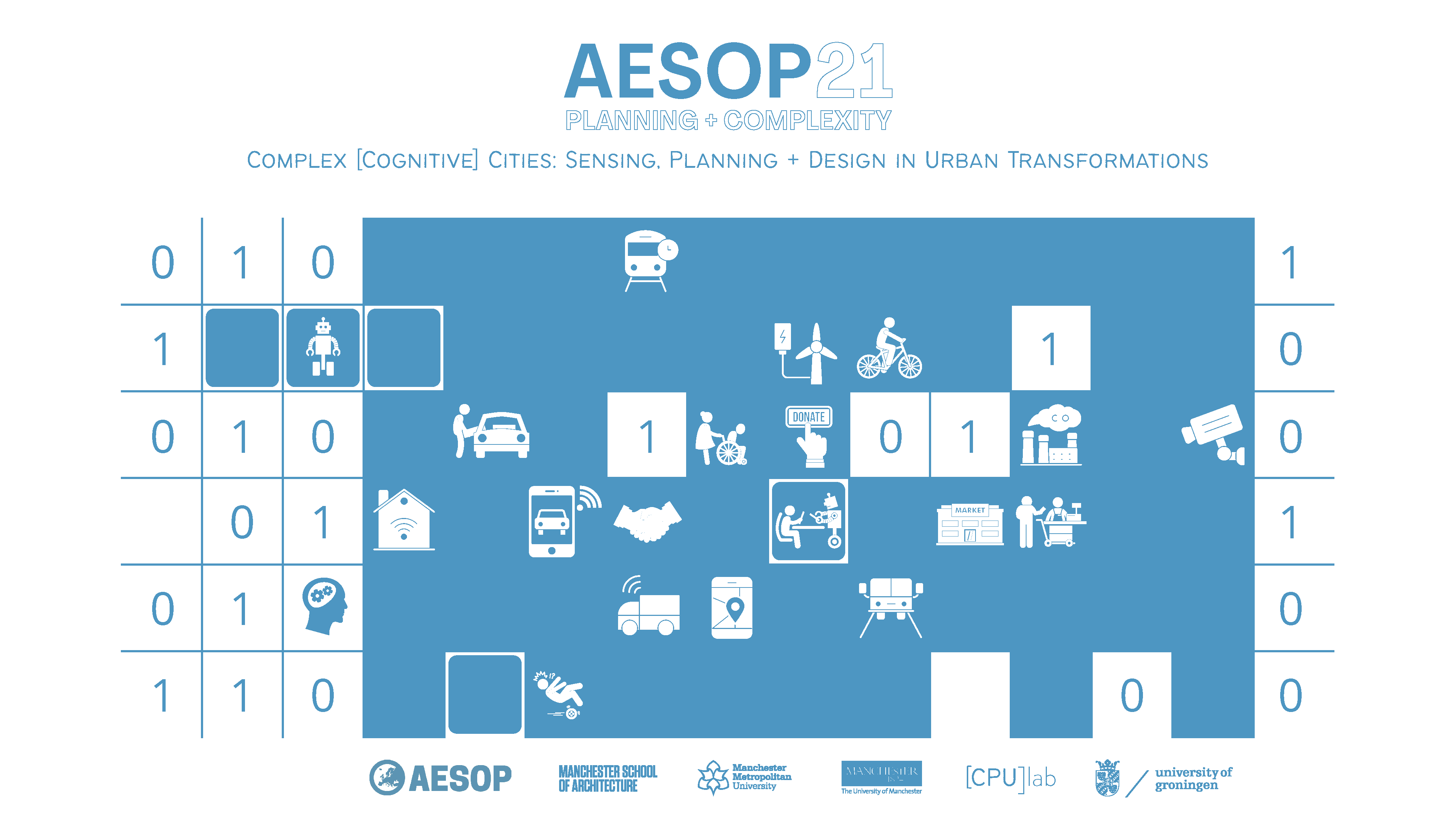20-22 April 2023, Manchester (UK) - The 21st meeting
Complex [Cognitive] Cities: Sensing, planning and design in urban transformations
We still have a few spaces left for the 21st AESOP Planning and Complexity thematic group conference, hence we are accepting a final round of abstracts until 23rd of January 2023
Planning and complexity engages with the plurality of the urban as a complex relational web of systems, processes and flows. The research field is an emergent combination of multiple and transdisciplinary perspectives attempting to analyse, understand, influence and design future trajectories of urban transformation using a complexity framework incorporating the temporal dimension. Complexity Theories of Cities (CTC) have incorporated a multitude of conceptual perspectives over time, including uncertainty, wicked problems, system dynamics, self-organisation, non-linearity, graph-based systems, emergence, path-dependency, transitions, coevolution, interdependencies, open systems, cognitive behaviour, adaptivity, soft and hard systems.
Today, societal transformations linked to technological change such as datafication, AI, automation and virtualisation, encapsulate new dimensions of potential risk and solution-oriented action, while suggesting the need for an updated CTC framework. In parallel, faced with catastrophic climate change and related undesirable sustainability outcomes, the ‘urban’ is seen as the site of influence, exacerbated impact and potential solution. Can engagement with complexity provide frameworks and approaches that have eluded us so far?
In 2012, the collection of papers in the publication titled “Complexity Theories of Cities Have Come of Age'' suggested that urban planning and design researchers had arrived at a moment in time that marked the convergence of a research field into a united understanding of the underlying theoretical frameworks. The complexity sciences have since continued to enrich urban planning and research conceptually and methodologically. Planning and design continue to draw from multiple areas in the complexity field by building on historic concepts such as economic complexity and associated ideas of equilibrium and the invisible hand, complexity in physics and mathematics with reference to the systems on the edge of chaos and non-linear systems, ideas of bottom-up organisation from the social-sciences and evolutionary perspectives from ecology through complex adaptive systems. The theories from different disciplinary areas have been conceptually and sometimes metaphorically incorporated into urban planning and design to understand and intervene within transformative urban processes.
Ten years later, we continue to acknowledge cities and processes of operating with and in them as examples of complexity. We know that urban systems and sub-systems are dynamic, temporal, emergent and cognitive, requiring interdisciplinary research frameworks. We utilise methodological approaches from complexity to understand urban phenomena and the organisational complexity of intervention within these complex (cognitive) systems. However, we have yet to bring the conversation back to the city and how core concepts of complexity might in turn be informed by research from the urban fields.
Conference Themes
- Foundations of Complexity: Unravelling key complexity concepts, their meaning, opportunities and barriers to use. Leading on to the ‘fundamental questions’: What are the useful connections between complexity, urban planning and design and what these fields can in turn contribute to complexity theories?
- Sensing Complexity: Exploration of new opportunities to utilise complexity perspectives based on new types of urban data and practice as part of the Digital Turn and the 4th Industrial Revolution (datafication, Smart Cities, digital exclusion, Big Data, IoT, AI, Machine Learning, automated data collection, data analytics). Methodological research exploring different perspectives and approaches in this context, including disciplinary transfer for measuring, describing and analysing complex phenomena and developing new data driven scenarios.
- Designing ‘in’ Complexity: Design can be speculative, communicative, solution oriented and value based. The list is longer, but the focus remains on changing the current towards more desirable futures. In urban planning and research, this ambition necessitates engagement with the complexity of existing systems, trajectories of change, implications of interventions and recognition of unknowns. We welcome experiments with complexity towards sustainable futures through approaches embracing adaptability, flexibility, conditions, pre-conditions and pathways. This event will have a special focus on an updated ‘design science’ approach, involving the development of computational tools to design and co-design alternative possibilities and test ex-ante performance based on identified values and societal goals. Alternative design approaches engaging with complexity are welcome towards a design debate.
- Planning and Complexity: Complexity theories in planning emphasise the need to open the planning process for unexpected crises (system disruptions) and unplanned incremental adaptations. The potential of complexity-related concepts (co-evolution, emergence, self-organisation, adaptive capacity) to improve decision-making in such uncertain contexts is not yet fully explored. We welcome empirical and conceptual studies related to: How are planners and public policy makers dealing with uncertainty in their daily practice? How do they explore potential futures and learn from such explorations? And what kind of skills and roles require more attention in navigating uncertainties in decision making processes?
Key Words/Concepts
Self-organisation, Emergence, CAS, Non-linearity, Adaptation, Anticipation, Cognition, Resilience, Evolution, Systems, Planning, Roles in Planning, Urban, Design, Scenarios, Smart, Data, IoT, Design Science.
Date and Location
20th, 21st and 22nd (half day) of April 2023
Manchester School of Architecture, Manchester Metropolitan University
Manchester, UK
Paper Submission Requirements
Abstract submission deadline (extended): 23rd Jan 2023
The abstract should be 450-500 words (word or pdf format), with title, authors, affiliations, 5 key references, 5 key words and type of paper identified (conceptual, methodological and/or original research papers are welcome).
Outline paper deadline: 15th April 2023
The organisers are currently finalising a special issue with a leading academic journal. On this basis, the outline paper submissions will be a formal process using a conceptual, methodological or original research paper template (to be provided on abstract acceptance) related to a 3500 word submission prior to the event. We believe researchers from all levels of experience can engage with this opportunity for quality publication.
Keynotes/pre-lectures
The keynote speakers will be announced shortly (please see some prior keynote videos here: https://www.complexurban.com/video/)
Abstract acceptance will also mean you will be informed of two online events on key complexity theory areas prior to the event (a warm up).
Email Address for Abstracts


